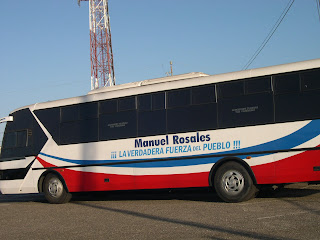 Quico says: So, wondering why posting’s been so light recently? Here’s the deal: I spent the last three weeks in Caracas. Elementary paranoia kept me from disclosing as much before coming back, but now that I am safely ensconced in a forgotten little bit of the Dutch countryside I will, of course, be posting at length about the trip.
Quico says: So, wondering why posting’s been so light recently? Here’s the deal: I spent the last three weeks in Caracas. Elementary paranoia kept me from disclosing as much before coming back, but now that I am safely ensconced in a forgotten little bit of the Dutch countryside I will, of course, be posting at length about the trip.Now, I’d love to tell you I went back to immerse myself in the politics of a renascent opposition, or the travails of my nearest barrio, or the wonders of our natural heritage. Alas, my motives weren’t so pure: basically, it was Misión Cadivi that brought me back. As a Europe-based Venezuelan student, I qualify for a
irresistible cupo of $1,800 each and every month, payable at a scrumptious, nibbliscious Bs.2,150/$.
Hell, I’m just a grad student: I’m in no position to pass up that much free cash.
Filthy lucre, yes, how very counterrevolutionary of me…or, is it?
On the one hand, I realize it’s a bit problematic to get on my high horse and denounce the systematic ransacking of the nation’s oil wealth as I sign on enthusiastically on the side of the ransacketeers.
On the other hand, what I’m doing is scrupulously (if counterintuitively) legal: I really am Venezuelan, really do study in Europe, and ultimately am just taking advantage of a policy that wouldn’t even exist if the revolution hadn’t put it there. As far as petro-state plunder goes, it doesn’t get much more zanahoria than my case: I’m not even scamming the system! Hell, it's almost unvenezuelan to do it this way...
Still, the irony is hard to get over: I, great escualido cyber-scourge of the revolution, just about doubled my income on the revoluion’s dime just by filing a few forms.
In Caracas, I found that I was far from alone. In the appallingly sifrino circles I tend to inhabit when I’m down there, Cadivi has become a kind of universal obsession: everybody I met had either just finished asking for their dollars, was fighting the Cadivi website for their cupo, had an aunt who’d just come back from Miami to cash out her’s, or some cognate of these stories.
At my sister’s house, where I was staying, even the maid was in the loop: the bureaucratic nightmare she was facing trying to send family remittances back to her folks in Colombia was easily the most hairraising of the bunch.
My second day in town (first day I was getting my cédula, so here's lookin' at ya, syd) I went down to my bank in Sabana Grande to explain my situation to them. I was told that, on top of my student cupo, I could qualify for a $5,000 traveller cupo as well.
To do so, I would need to take out one of their credit cards…for which processing times had risen to TWO MONTHS because, these days, everybody and his cousin's cat is desperately trying to get a credit card, precisely so they can get those 5,000 insanely subsidized dollars.
It’s a policy I found especially telling. To get the travellers’ cupo, you have to have a credit card, and to get a credit card you basically have to be middle class. My sister’s maid, as you can guess, can’t get one: she has neither a credit history nor a high enough salary for any sane bank to give her one. So, in practice, the revolutionary socialist state systematically discriminates against her (and everyone else who is poor) in one of the most expensive and systematic wealth ridistribution policies it runs.
This is no detail. Because, trust me, you’d have to add up a lot of misión scholarships to match the implicit subsidy in the 5,000 official-rate-dollars handout that only credit card-holders can even apply for.
It’s a realization that brought me back to a point Katy made a long time ago, but whose deeper truth only really sank in during my trip: if you revisit the Maisto Doctrine and judge chavismo by what it does rather than what it says, you have to conclude what we have in Venezuela is something like a right wing dictatorship.
All revolutionary/discursive paja aside, the government lets nothing stand in its way in its drive to redistribute oil income up the income scale. The mountains of bullshit that come out of Chávez mouth have tended to obscure this reality, yes, but have never altered it.
For those with the courage to revisit Maisto's supposedly (but only superficially) discredited theory, it’s really no surprise that the Central Bank finds income inequality is rising in Venezuela: the socialist revolutionary government’s two weightiest macroeconomic policies uniformly shift income up to the privileged.
A staggering seven percent of GDP is spent on a deliriously regressive gasoline subsidy, while untold billions of oil dollars are spent subsidizing the imported toys the rich amuse themselves with.
Needless to say, Maisto and his doctrine aren’t particularly fondly remembered in opposition circles these days. To my mind, though, the man was a visionary, a misunderstood genius. He was the first to intuit a truth that grows harder to ignore every day in Venezuela: that government discourse and government reality aren’t just “in tension” with one another, or “not always easy to reconcile” or even “sporadically contradictory", but rather run in completely opposite directions, and do so systematically, on the most salient policy fronts, and have done for a long time.
Seriously, take it from me: a Mantuano-descended reactionary and incorregible government critic just back from a Cadivi-funded junket that doubled his income.

























